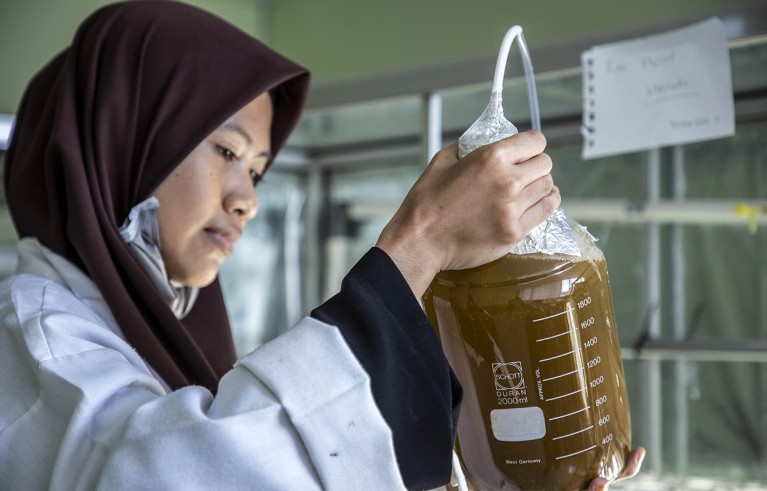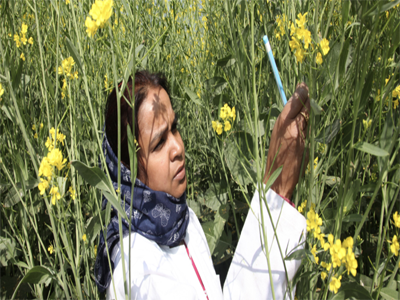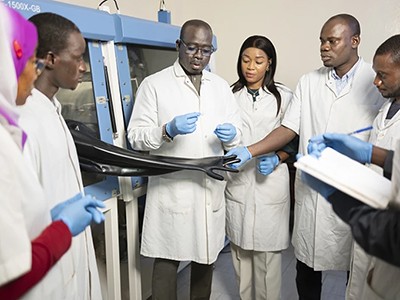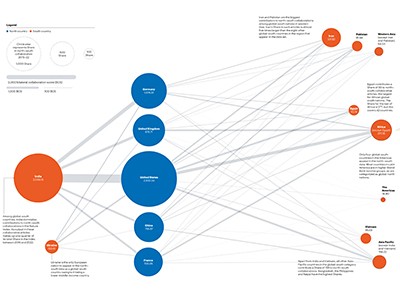
Indonesia is among the low-income countries that have embraced open-access publishing, with more than 80% its research output being freely available.Credit: Donal Husni/NurPhoto via Getty
Open-access publishing can help to drive the flow of academic papers to and from researchers, especially those in resource-poor settings. But for scientists in low-income countries, power imbalances and a lack of visibility are making it harder for them to take full advantage of this access.
Calls to ensure that the open-access movement actually helps researchers in low-income countries — which often have a history of colonial occupation — have escalated after a study showed that these regions are not benefiting as much as they should.
The study, published in January1, compared citations of open-access papers with those of non-open access papers to show how making research freely available can affect how widely it’s read around the world.
“It was important to put some real effort into proving the benefits that we are claiming for open access,” says study co-author Cameron Neylon, who studies research communications at Curtin University in Perth, Australia.

Nature Index 2023 annual tables
Neylon and his colleagues examined 420 million citations over the period 2010–19 for 19 million research outputs and found that the open-access papers garnered more citations than non-open-access ones did. For example, open-access papers that were published in 2010 had an average of 44 citations each, compared with 28 each for non-open access articles from that year. Furthermore, open-access papers were cited by authors in a more diverse set of countries and disciplines.
Among all open-access articles examined, those that were made available through a platform other than the publisher, such as a repository on a university website (classified as green open access) had the most citations.
Researchers in low-income countries received relatively few extra citations from making their papers open access, says Neylon. Authors in Northern Europe were found to get the biggest boost, whereas those from African countries got among the smallest.
The results reveal that, although the proliferation of open access has enabled wider dissemination of findings, more research is needed to determine whether authors in low-income countries are actually benefiting from the increased availability.
Open access from and to low-income countries
Table of Contents
The past decade has seen rapid progress in open-access publishing. Almost half of the world’s research output in 2020 is now available to be read or downloaded without payment, according to the Global State of Open Access 2021 report, which draws on data from several bibliometric services2. Those advocating for open access often argue that there is a moral obligation for researchers to share knowledge with their peers in countries that do not have the funds to cover access fees.
Open access also plays a part in improving the flow of research from poorer countries to the rest of the world.

Four global-south researchers making cross-border collaborations count
Many low-income countries have extensive open-access-publishing infrastructure for researchers to share their work with others. Governments of several Latin American nations have funded open-access journals since the late 1990s, and more recently, a surge in local open-access journals and publishing portals in Indonesia has led to more than 80% of the country’s research output being freely available.
Susan Murray, who leads African Journals OnLine, a bibliographic database of African-published peer-reviewed research based in Grahamstown, South Africa, says that there are now thousands of open-access journals based in low-income countries. But without changing some of the more entrenched aspects of local research systems, the full benefits of open access for researchers in low-income countries might not be realized, she says. Murray notes that those researchers are often more affected by power and resource inequalities than their counterparts in high-income countries — a problem that local incentives and rewards systems can exacerbate.
Another issue is that scientists in low-income countries might choose to focus on research topics that are of interest to editors of prestigious journals based in wealthy nations, in an attempt to advance their career, which further skews the research agenda. It also undermines the knowledge-sharing systems that exist in low-income countries and could prevent strong, relevant research from being distributed to those who need it.
“It is important to change this,” says Murray, to ensure that the research agendas of low-income countries focus attention on their needs, challenges, priorities and interests, such as climate change, malnutrition and infectious diseases. “Without research in, for and from these countries — along with channels to readership of the outputs — these problems will persist,” she says.
Greater support from high-income countries
The challenge for organizations that run low-cost options — such as journals and platforms that do not charge author or reader fees — is that they tend to be centrally funded or run by volunteer work, says Elizabeth Marincola, an open-science adviser to the Science for Africa Foundation in Nairobi. “It is hard to maintain editorial and peer-review consistency and speed using this model,” she says. But the fact that they are gaining traction is positive for low-income countries, she adds.

North–south country collaborations reveal untapped potential
Speed is an important factor in ensuring that research from low-income nations is more widely read, because if the quality of work is consistent, the faster it is published and the more citations it gets, says Marincola. This is particularly true in the life sciences, she adds, in which research tends to move quickly.
A major policy change by one of the world’s largest funders for research in low-income countries could lead to reports being shared faster. In April, the Bill and Melinda Gates Foundation, based in Seattle, Washington, announced changes to its open-access publishing requirements, including a requirement, from 2025 onwards, for grant recipients to post their manuscripts on an open-access preprint server. The organization will also no longer fund article-processing charges (APCs) for articles to be published in peer-reviewed journals.
There are also emerging reports from South America and Indonesia that suggest that some open-access journals are discussing the introduction of APCs. This is troubling because these fees are inequitable, says Juan Pablo Alperin, who studies publishing at Simon Fraser University in Vancouver, Canada, and he questions how important the citation advantage is for researchers.
“APCs can appear as an attractive solution for individual journals, but their proliferation will ultimately defund the vibrant and diverse publisher and reader fee-free open-access ecosystem in the global south,” says Alperin. “With limited funds, institutions that are currently supporting publishing programmes will divert resources to ever-growing APCs, with devastating consequences for local publishing capacity.”
